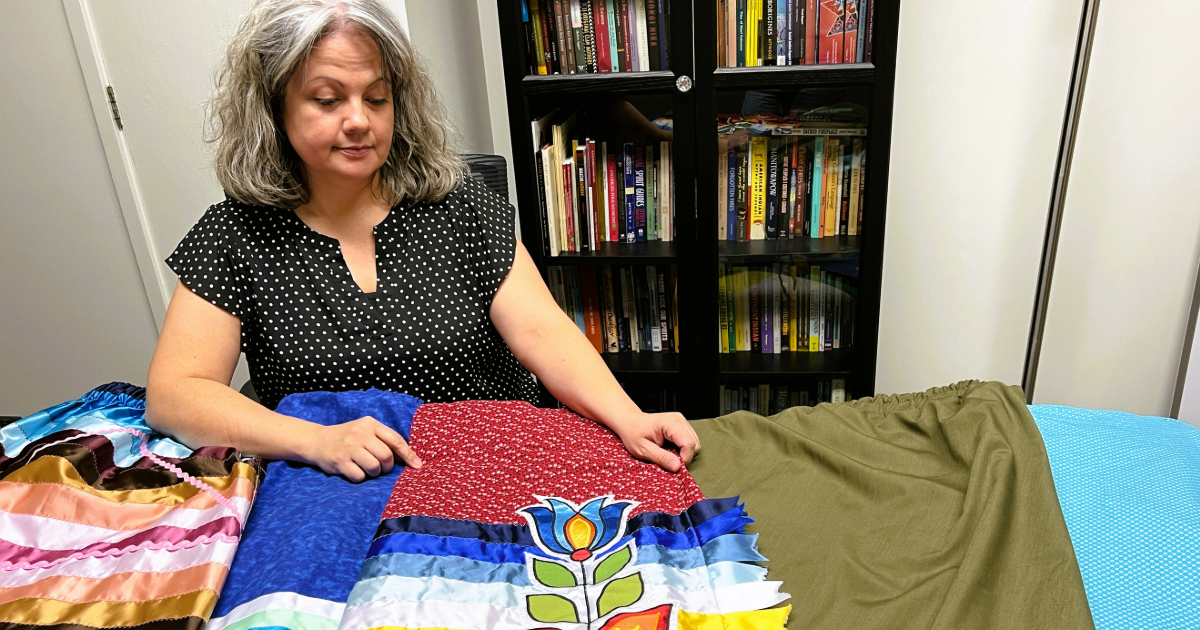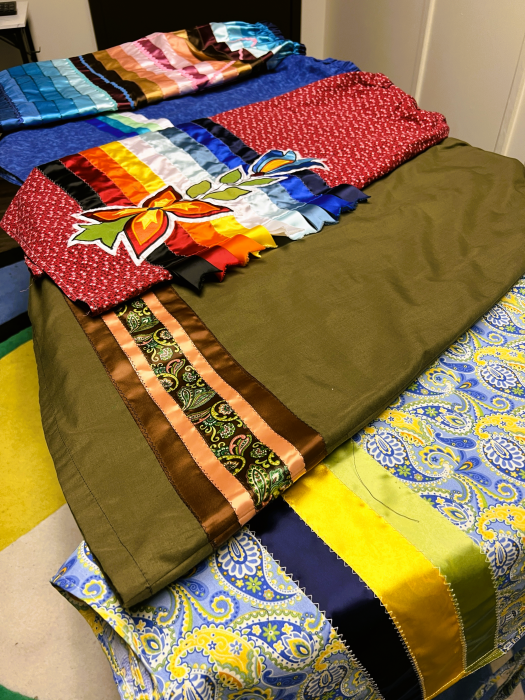
Chantal Daniels has been making ribbon skirts and other traditional items for more than 20 years.
National Ribbon Skirt Day
“I wear it because it gives me strength”
January 4, 2024, marks the second annual National Ribbon Skirt Day in Canada – a day to learn more about and to celebrate Indigenous culture, traditions, histories and contributions.
While this national day has only recently been established, ribbon skirts are a centuries-old symbol of identity, adaptation and survival for Indigenous women, girls and gender-diverse people.
Chantal Daniels, a Cree woman from Misipawistik Cree Nation and the director of Ongomiizwin Education with the Rady Faculty of Health Sciences at the University of Manitoba, has been sewing ribbon skirts for more than 20 years.
“Art has always been there for me,” says Daniels. “I sew almost every day, even if it’s just for half an hour. It’s an emotional release that allows me to debrief my mind and just be in the moment.”
Daniels learned to sew by sitting with her auntie and making star blankets. For her, it was a way to soak up a piece of her family knowledge. She encourages everyone to get traditional teachings about ribbon skirts by presenting tobacco to Elders in their own communities and learning more about them.
 For Daniels, learning to sew traditional items gave her a sense of empowerment.
For Daniels, learning to sew traditional items gave her a sense of empowerment.
“These are important items that we, as Indigenous people, need in our bundles. It’s not just ribbon skirts – it’s ribbon shirts, pow wow regalia, medicine pouches, tobacco bags, pipe bags – all these things, and I could now make them myself and provide them for my family.”
Daniels says she wanted to give that feeling to others, so she began offering classes.
“Now, I’ll see some of the learners I taught making their own ribbon skirts and selling them, and it just makes my heart happy that there’s more and more of us out there that are able to do this skill,” says Daniels.
Daniels says the evolution of the ribbon skirt over the years means she has skirts she wears only for ceremony, but that she also owns skirts she can wear every day – to work or to the grocery store.
“I absolutely love wearing my ribbon skirt in public,” says Daniels. “Especially here, there are a lot of places that we have never taken up space in before. When I wear my ribbon skirt to work at the university, it’s claiming space within these hallways, within these classrooms.”
When she wears her skirt, Daniels finds people often approach her to ask about it, sparking a conversation about Indigenous culture. For Daniels, the establishment of National Ribbon Skirt Day does the same thing.
“I think it’s nice for mainstream society to start educating themselves and recognizing some of the things that we value as Indigenous people. Part of truth and Reconciliation is educating yourself on our ways and this is another way to do that.”
Daniels says that wearing her ribbon skirt gives her strength.
“Sometimes, I’ll purposely wear my ribbon skirt if I know I’m going to be in a challenging meeting or taking part in something heavy because it reminds me of who I am,” says Daniels. “I am an Indigenous woman, my ancestors who walked before me have laid down the path so I can be here, and it’s my responsibility to continue to lay down that path for my daughters, my daughters’ daughters and all the young women that come behind me.”
National Ribbon Skirt Day originates with the story of Isabella Kulak. A member of Cote First Nation, Saskatchewan, Isabella was shamed for wearing her handmade ribbon skirt to a formal wear day at her elementary school. Isabella’s story shone a light on the enduring injustices, racism and discrimination faced by First Nations, Inuit and Métis people in Canada every day, and on the importance of making sure that what happened never happens again to anyone in Canada.






